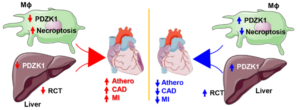Trigatti Lab receives CIHR grant to investigate new pathways involved in coronary artery disease

Role of the multi-subunit adaptor protein PDZK1 in atherosclerotic coronary artery disease
Why is this research important?
Atherosclerotic coronary artery disease (also known as hardening of the arteries, or coronary heart disease) is a leading cause of heart attacks and death. The wide use of statins and other cholesterol lowing drugs has reduced the incidence of coronary heart disease, but despite this, it remains a major burden to the health of Canadians. Therefore new molecules and biochemical pathways that can be targeted need to be identified. Ultimately combining novel treatments targeting these new pathways with current treatments such as cholesterol lowering can achieve much greater treatment effects than current approaches.
How will you use this funding?
In an on-going effort to discover new treatment targets, we have used genetically modified mice as an experimental model to explore the roles of different pathways in coronary heart disease. We found that inactivating a protein called PDZK1 dramatically increases atherosclerosis in mice with high cholesterol levels, such that they begin to develop heart attacks. This new funding from the Canadian Institutes of Health Research for $940,000 over 5 years will allow us to discover the mechanisms involved in this so that we can exploit those mechanisms to develop new treatments. In particular, we are examining pathways that regulate the abundance of PDZK1 as a strategy to increase resistance to atherosclerotic disease.
How will your research advance the field?
If this research is successful the pathways we discover could have the potential to be translated into treatments for people to prevent coronary heart disease.

Legend:
Mφ: Macrophage
Necroptosis: A cell death pathway contributing to heart disease
RCT: Reverse cholesterol transport (a pathway that protects against heart disease)
Athero: Atherosclerosis
CAD: Coronary Artery Disease
MI: Myocardial infarction


